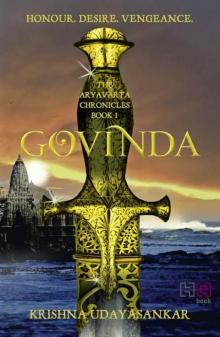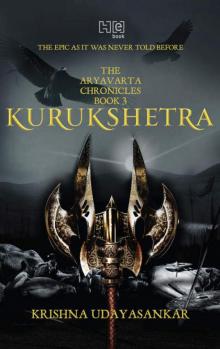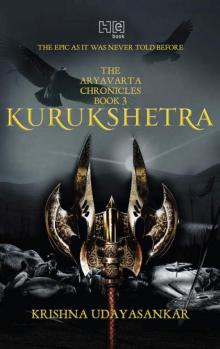- Home
- Krishna Udayasankar
The Aryavarta Chronicles Kaurava: Book 2 Page 4
The Aryavarta Chronicles Kaurava: Book 2 Read online
Page 4
Devala cried out again, as Shikandin rasped, ‘The only reason you’re still breathing is because the Vyasa insists it be so. For my part, I would have liked to gut you alive and then slit your throat.’
‘Calm down, Shikandin. This scum deserves to die many times over for what he has done. But that pleasure shall be denied us… for the time being,’ Asvattama said. He added, ‘We better get out of here before one of us steps on this infernal thing by accident. I’ll set it off once we’re a safe distance away. Sanjaya, he’s all yours now. Take him, and don’t lose him!’
Sanjaya made to retort but seemed to reconsider. He pulled his sword out of its scrabbard and pointed it, quite unnecessarily, in Devala’s general direction. He signalled to four gigantic men who had been waiting quietly behind the soldiers. The men – guards of Hastina’s prison as was evident from their metal and hide uniforms – gleefully stepped forward to take the Firewright into their custody. Once, their vocation had demanded gruesome excellence in various methods of torture, skills that had been perfected during the Great Scourge when Firewrights, or those accused of being of the order, had filled Aryavarta’s prisons in plenty. There was little demand for their art now, and the four guards regarded Devala with childlike joy.
Shikandin helped the men secure Devala’s hands and legs so that he could walk with assistance, but do little else. Asvattama confiscated the Firewright’s possessions and checked his person for concealed weapons. Together, the two pulled the prisoner to his feet. Devala looked from one to the other, making no effort to hide his contempt. Finally, Asvattama pulled out a scroll from a band on his upper arm. He did not bother to unfurl it, merely flashing the seal emblazoned onto the scroll for emphasis. In a strong voice, he declared, ‘In the name of Dharma Yudhisthir, Emperor of Aryavarta, you are under arrest. You will be taken to Hastina for further interrogation, following which you will be tried and sentenced for your crimes.’
‘And what crime might that be?’ Devala spat out, his rage now heightened by his predicament.
Shikandin replied, ‘The crime of being a Firewright.’
Devala laughed, cold and cruel. The sound filled the air with an unnatural sense of foreboding, and around them birds and small animals added disturbed cries of their own. He waited till all was silent again before saying, so that only the two men next to him could hear, ‘Firewright, huh? In that case, tell your executioners to sharpen another blade. You both know that I’m not the only one.’ With a last, defiant glance at the two, who refused to be provoked to show any reaction, he let the prison guards lead him away to the edge of the woods, where they had tethered their horses. Sanjaya followed right behind.
The sun had risen and the mist dispersed by the time the prison guards brought Devala out of the forest. He did not protest as the guards chained his wrists to his ankles and unceremoniously heaped him into a dark carriage that was little more than an airless wooden box mounted onto four wheels. Shikandin emerged from the woods, throwing a delighted glance in Devala’s direction as he rode past the still-stationary carriage. By the time the prison guards were ready to leave on what Devala knew would be a slow, silent journey, Shikandin and his companions had long faded away.
Closing his eyes, Devala let out a deep sigh, a sign of weakness that he knew he ought not to show but nevertheless failed to hold back. He expected to be left alone with the pain of his defeat and capture but, to his disgust, Sanjaya clambered on to the carriage and perched himself on the rough wooden plank set into one of the sides.
‘Go on,’ Sanjaya ordered the prison keepers.
The guards exchanged glances, making it obvious that they neither approved of nor appreciated Sanjaya’s presence in the carriage with their prisoner. Sliding open the small shutter that would admit a solitary beam of light into the otherwise sealed carriage, the guards lifted into place the heavy door and barred it shut with an iron rod. In the near-darkness, Devala and Sanjaya listened as the guards ran thick chains through rings set on the outside of the carriage. Shouts of instruction and coordination filled the air and, with a jerk, the carriage began to move. Soon, all conversation on the outside ceased, and the trundle of wheels and the rise and fall of the horses’ hooves filled the air in a deceptively soothing rhythm.
In a soft voice, Devala ventured, ‘I’m surprised, Sanjaya. You show more courage than I had expected, sitting here in the dark with me.’
‘As am I,’ Sanjaya replied. ‘It is your sheer foolishness that I find surprising, in the dark or otherwise.’
‘Foolishness? For all you know I have a dagger but a hair’s breadth away from your throat.’
‘If you do, that merely reaffirms my point. Only a fool lets his fear overcome his curiosity.’
‘Oh? What should I be curious about?’
‘For one, why the Vyasa insists that you remain alive when our dear friends Shikandin and Asvattama would both have loved to rip you in two and hack away at their half of your carcass? For another, why should I be here, suffering your presence, unless I thought it worth my while?’
A shadow flickered across Devala’s face, the beginnings of uncertainty. ‘What do you mean?’ he asked, terse.
Sanjaya sat back in his seat. A beam of light fell directly into his eyes through a small crack in the wooden sides. Still, he did not blink. The carriage passed over a rut in the rough road and the beam shifted. He closed his eyes, welcoming the cool purple that swirled before them. ‘You’re not alone,’ he suddenly announced. Softly, he added, ‘You were never alone.’
Devala’s breath was a hiss. ‘You? A Firewright?’ he asked with undisguised disbelief.
‘Not just any Firewright, Devala. A true Firewright. One born of the blood of those destined to rule these lands and, by Hara and Agni, I will claim that destiny!’
Many questions needed to be asked, but Devala knew there would be time, later, to swap stories. What mattered now was the hope that had risen in him against all odds. It was therefore with reluctance that he asked, as though he would be remiss if he did not, ‘How do I know you’re telling me the truth? I’ve neither seen you, nor heard of you, though I’ve spent much of my life among the Wrights. How do I know you are who you say you are?’
Sanjaya gave an approving nod. ‘My life is my proof. I have always shown loyalty to the Kuru kings and to the Firstborn, but I have done so to achieve certain things, and they will speak for themselves. Unless you would rather set your faith in whatever sychophant Secret Keeper that rebel Govinda Shauri will install to lord over us all… Perhaps you can worship a puppet that makes the right noises, but I would rather die than have a traitor command me in the name of my order, my kin! We will rise again, Devala, and not under some self-serving cowherd.’
The sheer improbability of Sanjaya’s assertions gave his claim more credence than any reasoned argument could. Devala set aside his reservations and directed his attention to the future. ‘Are there more of us? Enough of us to rise again? Where are they hidden? Jatavedas be praised! What I would give to set my eyes on true Firewrights, to live in their midst. But there will be time for that later. Has the uprising been planned already?’
‘Well, there’s the two of us…for now.’
Devala’s joy ebbed as swiftly as it had risen. ‘Two of us?’ he repeated, incredulous. ‘Say that a little louder, Sanjaya, and all it will get you is a cell next to mine, or the gallows. Two of us! Yabha!’
Sanjaya clucked his tongue in mild reprimand. He began to say something but stopped, reflecting quietly on his words. At length, he confessed, ‘Despite the fact that I hate Govinda Shauri with all my heart, there is one thing – just one thing – that I have learnt from him. Rather, I had occasion to learn because of him. Men are like cows, Devala. It doesn’t take a hundred men to herd as many cows. It takes just one. And so it shall be with us. The empire binds these fool kings together. Break this empire, and a man will no longer trust his own brother, a father will no longer trust his son. When that happens, they will turn to us.
They will hate us and fear us and turn to us because they will hate and fear each other more. All they will believe in is us; they will feel safe only in the power that we can give them. And just one name, one whisper of the word “Firewright”, will be enough to bring every one of them to his knees! Our name, Devala, our name! We will rule these men, these kings of Aryavarta by the power of our knowledge. We are enough.’
Devala squinted, unconvinced. ‘And Dwaipayana, the Vyasa?’ he asked. ‘What makes you think he won’t stop you – or the two of us, mighty force that we’ve now become?’
Sanjaya looked out of the slit in the door, taking in the scenery they passed by as if it were an everyday affair for him to ride in a prisoner’s carriage with a condemned man. He turned back to Devala with the same casual air and said, ‘Because I know the Vyasa’s deepest secret, the one fact that can destroy him and the entire Firstborn order with him. For the moment, it serves our purposes better to keep this in confidence, but there will come a time when I will set this wild beast off its leash and leave it to wreak its bloody havoc. The Firstborn shall pay a thousand times over for what they have done to our kind.’
Devala considered the words briefly, before breaking into a delighted grin. He opened his mouth and curled his tongue back, letting the other man see the thin, reed-like blade hidden underneath. The device had been trained on Sanjaya all the while. Devala made a show of spitting it out, letting it wedge, harmless, in the wooden floor of their carriage. ‘I wonder, Sanjaya,’ he coldly rasped, ‘which one of us is the more dangerous man.’
Sanjaya could not have been less perturbed or more cheerful as he said, ‘I look forward to finding out.’
5
DHARMA, EMPEROR OF ARYAVARTA, RECEIVED WHAT OUGHT TO have been the delightful news of Devala Asita’s capture with muted joy and the hint of a grimace. If the messenger who had brought him the missive was the least surprised by it, he did not show it as he withdrew. Dharma was left alone with an overwhelming sense of the one thing that bothered him beyond measure – irony. Indeed, his life was filled with it.
Many years ago, his unexpected, but not unwelcome, marriage to Panchali, daughter of King Dhrupad of Southern Panchala had brought him and his brothers out of their anonymity and into the line of inheritance to the Kuru kingdom. Dharma had thanked the gods and of course their preceptor and guide, Dwaipayana Vyasa. Never had he expected that the events that followed would lead him to the throne and, ultimately, to rule over an empire. The irony of it all surpassed by far the glory it brought, a glory that he lived with and ruled over, here at Indr-prastha, the capital of Aryavarta. He found no joy in the breath-taking visions of art and nature that greeted him at every step as he walked back to his personal quarters. His thoughts were far too despondent for that.
As a youth, Dharma had been only too aware of the politics that surrounded him. His father, Pandu, was the younger of King Vichitravirya’s two sons and had come to power only because the elder, Dhritarasthra, was blind. When Pandu had died, Dhritarastra had taken the throne and the question of succession had surfaced again – leading to inevitable tension between Dharma and Dhritarastra’s eldest son, Syoddhan.
Many a time, Dharma had thought, no, he had longed to set aside his claim to the Kuru throne. But he had never dared mention the notion aloud. His brothers and his mother would have been heartbroken and for their sakes Dharma had continued in the role that was expected of him, right to this day. Just as he had longed for a life of celibacy and frugality but had been thrown into matrimony for the sake of his brothers.
As Emperor, he had no interest in the affairs of government, in the endless disputes over water and land, or old, ridiculous feuds of honour between tiny fiefdoms that he had never heard of. The many nations were constantly scheming to edge up just another notch in Aryavarta’s complex hierarchy. Much to his disgust, their kings commonly bartered loyalties, and formed and broke alliances at will. Dharma genuinely believed that his duty was to uphold the supremacy of divine law, the sacred precepts laid down in the scriptures. But the political was now imperative and the spiritual merely optional.
His brothers could not understand his agony, leave alone share his burdens. The four of them had been brought up to believe that Dharma would guide them, and were incapable of even temporarily adopting the role of a leader. They were exceptional, no doubt, in their own ways, but none of them had the acumen for government. Nakul was charming, but lacked humility. Sadev was both humble and as wise, some said, as Vidur – Dhritarastra’s renowned royal counsellor and half-brother, and thus also their uncle. That may have proved to be his folly, for Sadev tended to avoid conflict at all costs. And Partha, of course, was dashing, brave and god-like. When it came to matters not connected with romance he was, however, notoriously indecisive. There was little argument against Bhim. He was brave, well-spoken and, above all, reliable. But Dharma had always thought of him as the strong, simple one among them, their protector and shield, never their leader.
The Emperor gnashed his teeth unwittingly as he confronted the thought that had irked him every moment in these past months. He, Dharma, was no better than his brothers. They were, at least, as strong as they were flawed. Each of them had their claim to distinction. But not he. The so-called flawlessness, the devotion to virtue that he was known for, meant nothing. And that meant he was nothing. For, all that he had he owed to the efforts of another. Govinda Shauri, Commander of the armies of Dwaraka.
Dharma tried hard to ignore the questions that sprang to his mind and the memories that surfaced in answer. Govinda’s actions at the Kandava forest, Govinda during the imperial campaign, Govinda in Vidharbha, Govinda at the Coronation… With great effort, he drew his mind back from the inevitable question: Why? What was in it for Govinda?
For the longest time Dharma had believed that it was he who had convinced Govinda to take their side, tempting him with the thought of his bloodline sitting on the throne of the Kurus and eventually on the imperial throne – Govinda’s sister, Subadra, was Partha’s wife, and their son Abhimanyu had been declared as the heir to Dharma’s throne well before Govinda had set out to consolidate Dharma’s kingdom for him. It had been so easy to assume that Govinda had acted in his nephew’s interests and, indeed, he often claimed that he loved Abhimanyu as his own son, a bond that Dharma had been happy to encourage. Now, the Emperor could not help but wonder if there was another explanation for all that had happened.
He dismissed the thought. It was best, he reasoned, that as Emperor he remain ignorant of certain things. He could not be held responsible for what he did not know. He was Dharma, the just and virtuous. It would remain that way. And he would continue to believe in Govinda’s best intentions and, in turn, owe everything to Govinda. His empire, his throne and even his wife, Panchali. The last thought brought to his mind another memory that he longed to forget.
Two days after the coronation, as they had lain in bed still covered in the sheen of their lovemaking, Dharma had asked Panchali what she felt like now that she was the ruler of an empire. Panchali’s answer had held neither awe nor romance. ‘The Emperor is powerless, yet susceptible to blame,’ she had said, ‘and the empire is stable but weak.’
He knew she was absolutely right. Theirs was an empire of consensus, held together partly by the threat of force and mostly through diplomacy. He, as Emperor, was nothing more than an uncontroversial individual, the kind who neither enjoyed great support nor suffered acute enmity. The many nations of Aryavarta, the Emperor’s vassals as they nominally were, found this to be an expedient arrangement. For the most part, their affairs were their own, but their problems were the Emperor’s. Every niggling impediment could be referred to the Emperor and easily resolved at some cost to the imperial treasury, while every failure could now be blamed on him. Most of the kingdoms found their tribute a reasonable price to pay for such immeasurable conveniences. They found it to be an acceptable arrangement, so acceptable, in fact, that it had taken just about a hundred days f
or the new empire to become their way of life.
Uncontroversial, unremarkable, acceptable – the epithets in honour of mediocrity were endless. And Dharma was just that – a harmless, powerless, mediocre ruler whom no one took seriously. He had tried not to give in to the maddening thought, but within weeks of his coronation it had consumed him completely. The memory of Panchali’s dispassionate assessment had made him want to take his own life simply to enjoy the anxiety and concern she would have displayed at losing him. Or perhaps, he noted, she would have been apathetic, the way she responded to most things these days. Panchali was no longer the fiery, outspoken woman she had once been. She had turned into a calculating diplomat. Silently, efficiently, she ran the empire. She took no credit for the things that went right, and ensured that her name was never mentioned anywhere by always acting through Dharma and his brothers, and the host of trusted diplomats who were her link to the outside world. Even in the presence of their closest companions, Panchali kept up the pretence of being nothing more than Dharma’s intermediary, merely conveying the Emperor’s orders and never giving her own. No matter what it looked like, though, he knew the truth as did many others associated with the royal court. Everything, from financing the armies, granting titles and collecting taxes to redistributing vassaldoms, setting up various industries and judging disputes, was in Panchali’s care. Courtiers, courtesans, spies – they all served her with a loyalty he had not anticipated.
‘You were raised to rule, Dharma,’ she had once told him. ‘You believe that loyalty, respect and obedience are yours by divine right as soon as you’re crowned. It’s quite natural; don’t torment yourself so.’
‘And what do you believe, Panchali?’ he had wanted to know.
Hesitantly she had replied, ‘I believe that these things must be earned.’
That day, Dharma had finally understood what it was he wanted the most – one chance to earn fame and bring glory upon his line. One chance to make Partha look at him with respect, to make Panchali yearn for him as women did for warriors. It was not a matter of vanity; it was one of duty. Destiny was an instrument of divine justice; the gods never blessed men with what they did not deserve. As far as Dharma was concerned, to doubt his merit to rule was to doubt the notion of Divine Order itself. He could not let that happen. He wanted the chance to irrevocably establish that Divine Order was everything, to prove that destiny towered over them all. He wanted to prove that he deserved to be Emperor of Aryavarta.

 Govinda (The Aryavarta Chronicles)
Govinda (The Aryavarta Chronicles) The Aryavarta Chronicles Kaurava: Book 2
The Aryavarta Chronicles Kaurava: Book 2 The Aryavarta Chronicles Book 03: Kurukshetra
The Aryavarta Chronicles Book 03: Kurukshetra The Aryavarta Chronicles Kurukshetra: Book 3
The Aryavarta Chronicles Kurukshetra: Book 3